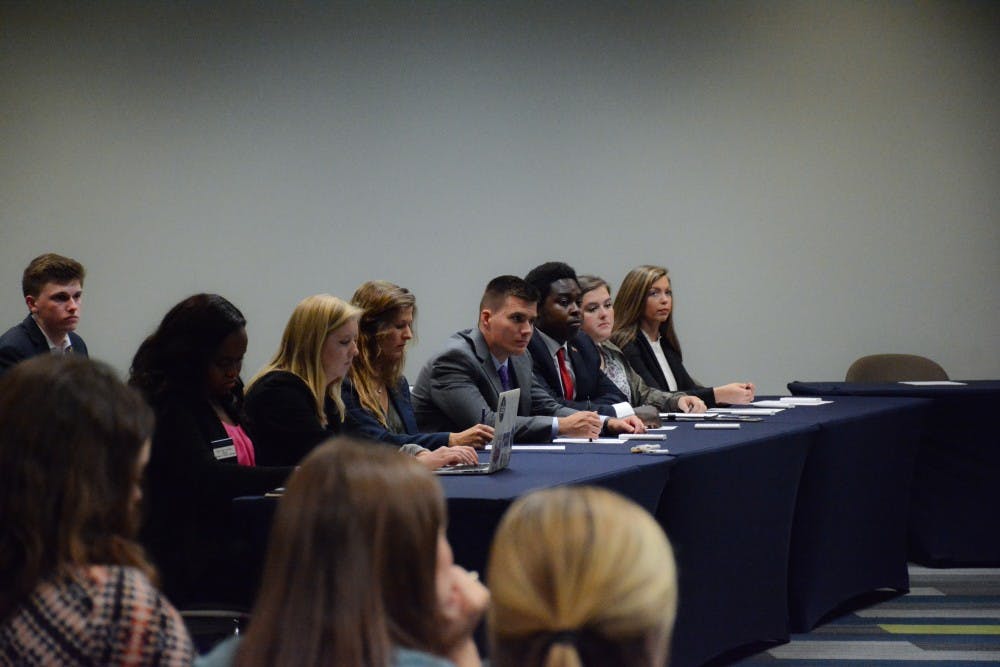The Student Government Association’s Student Senate voted to confirm the appointment of a full slate of judicial officials at its Sept. 7 meeting.
Louis Levesque, junior in economics and political science, was named chief justice.
Associate justices were Jordan Bailey, senior in industrial and systems engineering; Lizz Campbell, senior in graphic design; Ian Guerrero, sophomore in political science; Stephen Morris, senior in political science; Dylan Peterson, sophomore in biomedical sciences; and Ann Mason Smith, sophomore in marketing.
Alternate associate justices were Thomas Whatley, sophomore in finance, and Liam Walsh, junior in political science.
Gauge Horton, senior in building science, was named attorney general, and Camille Anders, junior in public relations, was named secretary.
The judicial branch, according to the SGA website, “maintains jurisdiction over the SGA Constitution and Code of Laws,” as well as checking the power of the other governing bodies within SGA.
This confirmation of candidates came following the senate’s decision to deny the first slate of appointments made by SGA President Rett Waggoner on July 12.
After the senate’s vote, Waggoner said he started from scratch with a new application process and, thanks to increased marketing efforts, a doubled pool of applicants.
“While I realize that this entire exercise is by its very nature political and that the whole nomination/confirmation process exists to create the third branch of our student government, it was nice to see that after months of restraint and study, principles of judicial constraint trumped personal political views,” Waggoner said later in a statement to The Plainsman.
Waggoner made his case for the new slate of appointees during his report to the Senate.
“We are learning lessons that no classroom could ever teach us — judicial philosophy, civility, oration, that the the tone we take with one another and the very words we choose have consequences and that the Constitution guarantees each of us the right to free speech without fear that our government will punish us if it disagrees with that statement,” he said.
Four of the previous appointees retained positions in the judicial branch, if not the same positions. The most notable shuffle in the judicial lineup affected two of these returning applicants, with Morris appointed associate justice and Levesque appointed chief justice.
Levesque said that as his “expectation was probably to get associate (justice) again,” he was excited to hear that he had been appointed chief justice.
“I was actually on Tiger Transit with a complete stranger sitting next to me, so I tried my best to contain myself,” he said.
Levesque, a member of Auburn University's Mock Trial Competition Team, cited his time with that group, as well as his two legal internships this summer, as his most valuable experience.
He said he holds “a lot of respect” for his fellow justices, including Lizz Campbell, who he said was his Camp War Eagle counselor.
“It’s almost a little intimidating, so I’m just excited to work with people who have again and again proven themselves to be capable,” Levesque said.
At the Sept. 7 Senate meeting, multiple students voiced their support specifically of Morris, newly appointed associate justice, followed by one student who opposed his confirmation.
“He was talking about personal responsibility, and that’s the first line of the Auburn Creed,” said Jaden Heard, sophomore in business.
This was in reference to a Tweet in which Morris claimed that “Personal responsibility — not more government — is the key to escaping poverty in America.”
Nick Reyzin, freshman in aviation management, said Student Senate’s denial of the chief justice position was an example of “cancel culture.”
“This is cancel culture, and it’s primarily affecting conservatives such as Stephen and myself,” Reyzin said. “Stephen was a victim of cancel culture … all because of wild, untrue, reckless accusations based on his beliefs.”
Dionne Meadows, sophomore in political science, argued that instead of “cancel culture,” the situation was “more about accountability,” noting that “Senate itself has pushed for Auburn to focus on social justice.”
“I was thinking about giving this speech about my upbringing and, you know, my experiences with poverty, food insecurity, homophobia, racism ... all these things that I’ve experienced that were really hurtful, really traumatizing,” Meadows said. “I don’t feel like I should have to tell you about my trauma, and cry, and give a sob story for y’all to understand why a man who holds a deep white savior complex and deep transphobic sentiment shouldn’t be confirmed for this position.”
Morris provided a statement to The Plainsman after the confirmation of the new justices.
“I applaud the Student Senate’s decision to focus on my qualifications rather than my political views and religious beliefs, resulting in an overwhelming majority voting to confirm my appointment to serve as an Associate Justice,” he said. “This is a major victory for the First Amendment at Auburn University and an essential check on the power of SGA.”
Morris also said he is looking forward to working with his "exceptional colleagues on the bench.”
Levesque said the justices, attorney general and secretary will meet together for the first time on Thursday, Sept. 16, to begin the training process for their new roles.
Do you like this story? The Plainsman doesn't accept money from tuition or student fees, and we don't charge a subscription fee. But you can donate to support The Plainsman.

Emma Kirkemier, junior in English literature with a minor in journalism, is the campus reporter for The Auburn Plainsman.





